
Borsa Istanbul Review
Scope & Guideline
Navigating the complexities of emerging markets.
Introduction
Aims and Scopes
- Financial Markets and Investment Analysis:
The journal explores the dynamics of financial markets, including stock market behavior, asset pricing, and investment strategies, with a particular focus on emerging markets like Turkey. - Corporate Governance and ESG Performance:
A significant area of research includes corporate governance practices, the role of environmental, social, and governance (ESG) factors in corporate performance, and how these elements influence financial outcomes. - Sustainability and Green Finance:
Research on sustainable finance, green bonds, and the impact of financial decisions on environmental sustainability is a core focus, emphasizing the intersection of finance and environmental considerations. - Macroeconomic Factors and Financial Development:
The journal examines the influence of macroeconomic variables on financial markets, including studies on monetary policy, economic growth, and the relationship between financial development and stability. - Behavioral Finance and Investor Psychology:
Insights into investor behavior, sentiment analysis, and psychological factors influencing financial decision-making are also prevalent, contributing to a deeper understanding of market dynamics. - Technological Innovations in Finance:
The impact of fintech, digital finance, and technological advancements on financial practices and market efficiency is a growing area of interest, reflecting the evolving landscape of the financial sector.
Trending and Emerging
- Sustainability and ESG Integration:
There is a growing emphasis on the integration of ESG factors in investment decisions, corporate governance, and financial performance. Research in this area highlights the importance of sustainability in driving long-term value. - Impact of Digital Finance and Fintech:
The rise of fintech and digital finance is a prominent theme, with studies exploring their effects on financial inclusion, market dynamics, and the overall efficiency of financial systems. - Behavioral Finance Insights:
Research focusing on behavioral finance and investor psychology is on the rise, addressing how cognitive biases and sentiment impact market behavior and investment decisions. - Economic Resilience and Crisis Management:
In light of recent global events, themes surrounding economic resilience, crisis management, and the effects of geopolitical tensions on financial markets have become increasingly relevant. - Technological Innovations and Data Analytics:
The use of advanced data analytics, machine learning, and artificial intelligence in finance is emerging as a key area of interest, reflecting the ongoing digital transformation of the financial sector.
Declining or Waning
- Traditional Financial Models:
Research focusing on classical financial models and theories has seen a decrease in publication frequency, likely due to a growing interest in more innovative and contemporary approaches that incorporate behavioral and technological factors. - Conventional Banking Practices:
Studies centered on traditional banking practices are becoming less frequent, as the focus shifts towards fintech solutions, digital banking, and alternative financing models. - Market Efficiency Theories:
The exploration of market efficiency, particularly in relation to the efficient market hypothesis, appears to be waning as empirical evidence increasingly highlights market anomalies and behavioral insights. - Static Analysis of Economic Indicators:
Research that solely relies on static analyses of economic indicators without considering dynamic interactions or technological impacts is less common, as scholars seek to incorporate more comprehensive and multifaceted approaches.
Similar Journals
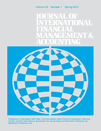
Journal of International Financial Management & Accounting
Empowering Scholars with Premier Financial InsightsThe Journal of International Financial Management & Accounting is a premier academic publication dedicated to advancing the fields of accounting, finance, and business management on an international scale. Published by Wiley, this esteemed journal boasts an impressive track record since its inception in 1989, converging insights from 1992 onwards to deliver cutting-edge research and analysis up to 2024. With an exceptional impact factor, the journal is ranked in the top quartile across multiple categories—Q1 in Accounting, Q1 in Business, Management and Accounting, and Q1 in Finance—as per the latest assessments. Its Scopus rankings further underscore its significance, placing it amongst the top 5% of journals in its respective fields. Although the journal is not open access, it remains an essential resource for researchers, professionals, and students seeking in-depth knowledge and innovative perspectives in international financial management and accounting practices. The journal’s commitment to high-quality research makes it a vital platform for thought leadership in a rapidly evolving global financial landscape.
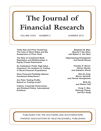
JOURNAL OF FINANCIAL RESEARCH
Bridging Theory and Practice in FinanceThe JOURNAL OF FINANCIAL RESEARCH, published by WILEY, stands as a pivotal platform for disseminating innovative research in the fields of finance and accounting since its inception in 1978. With an ISSN of 0270-2592 and an E-ISSN of 1475-6803, this journal aims to address contemporary challenges and trends within the financial research landscape. It has achieved notable recognition, being placed in the Q2 category for both Finance and Accounting in the 2023 rankings, signifying its relevance and impact within the academic community. Although it does not currently offer open access, the journal is accessible through various academic databases, catering to a diverse audience of researchers, professionals, and students keen on advancing their knowledge and understanding of financial systems and methodologies. With an evolving scope that encompasses empirical studies, theoretical frameworks, and practical applications, the JOURNAL OF FINANCIAL RESEARCH is committed to contributing valuable insights into the complexities of financial practices and policies.
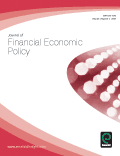
Journal of Financial Economic Policy
Connecting researchers and practitioners in the realm of financial economics.Journal of Financial Economic Policy is a premier academic journal published by EMERALD GROUP PUBLISHING LTD, focusing on the intersection of finance and economics. Through rigorous peer-reviewed research, the journal aims to advance understanding of financial policies and economic frameworks, addressing critical issues faced by financial markets and institutions. With an ISSN of 1757-6385 and an E-ISSN of 1757-6393, it serves as a reputable source of information for researchers, professionals, and students alike. The journal operates within the United Kingdom and is recognized for its contributions to the fields of economics and finance, achieving a Q3 category ranking in both disciplines as per the 2023 metrics. This places it within the top half of journals in its category according to Scopus ranks, demonstrating a solid impact in the academic community. Although it is not an open-access journal, the insights and analyses published are invaluable for those seeking to grasp complex financial phenomena and develop effective policies. The journal’s scope encompasses a wide range of topics relevant to contemporary finance and economic strategies, making it an essential resource for ongoing scholarly discourse and practical applications.
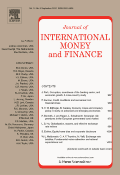
JOURNAL OF INTERNATIONAL MONEY AND FINANCE
Navigating the complexities of international monetary dynamics.JOURNAL OF INTERNATIONAL MONEY AND FINANCE is a premier scholarly publication dedicated to advancing the understanding of international finance and monetary economics. Published by Elsevier Science Ltd, this esteemed journal has been disseminating critical research since its inception in 1982 and will continue to contribute to the field through 2024. With a strong international presence and headquarters in the United Kingdom, the journal boasts an impressive collection of articles that explore significant trends, challenges, and innovations in the areas of economics and finance. Recognized for its impact, it ranks in the top quartile (Q1) in both the Economics and Econometrics and Finance categories as of 2023, signifying its influence and relevance among peers. Researchers, professionals, and students in these disciplines can benefit from the journal's rigorous peer-review process, ensuring high-quality scholarly outputs. Though not currently an open-access journal, it provides various subscription options to foster access to groundbreaking research in the financial ecosystem.
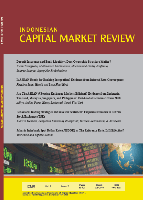
Indonesian Capital Market Review
Fostering Open Access to Capital Market ResearchIndonesian Capital Market Review is a prominent academic journal dedicated to the exploration of financial markets, investment strategies, and economic policies within Indonesia and Southeast Asia. Published by Universitas Indonesia, this journal has been an essential resource for researchers, professionals, and students since its inception in 2009, offering open access to its content to promote wider dissemination of knowledge. With an ISSN of 1979-8997 and an E-ISSN of 2356-3818, it aims to bridge the gap between theoretical frameworks and practical applications in the capital markets. By rigorously vetting its publications, the journal enhances the academic discourse surrounding financial systems, thereby empowering stakeholders with empirical insights. The commitment to open access ensures that groundbreaking research is readily available to a global audience, advancing the understanding of capital market dynamics in Indonesia and beyond.

JOURNAL OF ECONOMICS AND FINANCE
Navigating the complexities of modern economics and finance.JOURNAL OF ECONOMICS AND FINANCE, published by SpringerNature, is a leading academic journal that has been addressing critical issues in the fields of economics and finance since its inception in 1992. With an ISSN of 1055-0925 and an E-ISSN of 1938-9744, this journal offers scholars a platform to share their groundbreaking research and insights, contributing to the advancement of economic theory and financial practices. Although it operates under a traditional access model, the journal maintains a reputable standing within the academic community, evidenced by its 2023 Quartile ranking of Q3 in both Economics and Econometrics as well as Finance. Its Scopus ranking further reflects its relevance, securing positions of #355/716 and #159/317 in the respective categories. The journal aims to foster a comprehensive understanding of economic dynamics and financial innovations, making it an invaluable resource for researchers, educators, and practitioners who seek to explore contemporary trends and challenges within these disciplines.
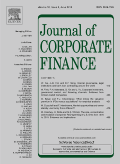
JOURNAL OF CORPORATE FINANCE
Exploring Innovative Strategies in Corporate FinanceJOURNAL OF CORPORATE FINANCE, published by Elsevier, is a premier academic journal that represents the forefront of research in the fields of corporate finance, economics, and management strategies. With an impressive Q1 ranking across multiple categories and a 95th percentile standing in Scopus rankings, this journal is pivotal for advancing knowledge and fostering discourse among scholars, practitioners, and students globally. The Journal has been in continuous publication since 1994 and welcomes submissions that contribute to the understanding of corporate finance and related disciplines. Although it operates under a traditional access model, the Journal offers a rich repository of research outcomes pivotal for informed decision-making in corporate environments. Researchers and professionals looking to enhance their understanding of contemporary finance phenomena will find the JOURNAL OF CORPORATE FINANCE an invaluable resource.

EMERGING MARKETS FINANCE AND TRADE
Driving Research on Trade Trends and Economic PoliciesEmerging Markets Finance and Trade is a leading academic journal published by Routledge Journals, Taylor & Francis Ltd, specializing in the dynamic field of finance and trade within emerging markets. This journal boasts an impressive impact factor and ranks in the top quartiles of its categories, attaining Q1 status in Economics, Econometrics and Finance (miscellaneous) and Q2 in Finance as of 2023. With a strong focus on innovative research, it publishes cutting-edge studies and insights that are crucial for understanding the complexities of financial systems in emerging economies. The journal, with ISSN numbers 1540-496X and 1558-0938 for its electronic version, offers a platform for both established researchers and newcomers in the field, highlighting the latest trends, policies, and challenges in finance and trade from 2002 to 2024. While it maintains a subscription-based access model, its significant contributions make it a must-read for academics, professionals, and students alike who seek to navigate and influence the rapidly evolving landscape of emerging markets.
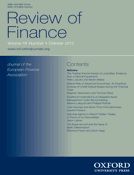
Review of Finance
Advancing financial knowledge through rigorous research.The Review of Finance, published by Oxford University Press, stands as a premier academic journal in the fields of Finance, Accounting, and Economics. With an ISSN of 1572-3097 and an impressive track record stretching from 2001 to 2024, this journal is consistently recognized for its high-quality research, reflected in its Q1 rankings across key categories, including Accounting, Finance, and Economics and Econometrics. The Review of Finance is dedicated to advancing the understanding of financial phenomena through robust empirical and theoretical insights, making it an essential resource for researchers and professionals alike. Additionally, its strong Scopus rankings, placing it in the top percentiles, highlight its influence and relevance in ongoing academic discourse. Although the journal is not open access, it remains widely accessible through academic institutions, ensuring that its valuable contributions reach an extensive audience. The editorial board invites submissions that promise to further engage the academic community in the dynamic intersections of finance, accounting, and economic research.
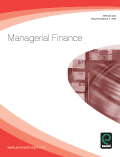
MANAGERIAL FINANCE
Bridging Theory and Practice in Financial Management.MANAGERIAL FINANCE is a prestigious academic journal published by Emerald Group Publishing Ltd, focused on the areas of finance, management, and strategy. With an ISSN of 0307-4358 and an E-ISSN of 1758-7743, this journal has carved a niche for itself within the business and financial sectors, achieving a commendable Q2 category ranking across multiple domains, including Business, Management and Accounting, Finance, and Strategy and Management, as of 2023. The journal aims to provide a platform for insightful research and critical analysis while fostering an understanding of contemporary financial practices and theories. With its wide-ranging scope, it serves as a vital resource for researchers, professionals, and students alike, looking to stay abreast of the latest trends and challenges in managerial finance. The editorial board is committed to maintaining academic rigor, ensuring that articles published are of the highest quality and relevance to the field. By bridging the gap between theory and practice, MANAGERIAL FINANCE is an essential reference for anyone involved in financial decision-making and strategic management.